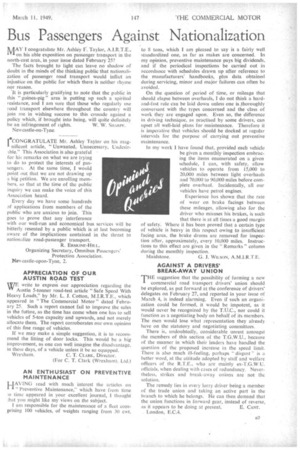Bus Passengers Against Nationalization
Page 15

If you've noticed an error in this article please click here to report it so we can fix it.
MAY I'congratulate Mr. Ashley F. Taylor, A.I.R.T.E., IYA on his able exposition on passenger transport in the north-east area, in your issue dated February 25?
The facts brought to light can leave no shadow of doubt in the minds of the thinking public that nationalization of passenger road transport would inflict an injustice on the public for which there is neither rhyme nor reason.
It is particularly gratifying to note that the public in this " guinea-pig " area is putting up such a spirited resistance, and I am sure that those who regularly use road transport elsewhere throughout the country will join me in wishing success to this crusade against a policy which, if brought into being, will quite definitely be an infringement of tights. W. W. SHARPE. Newcastle-on-Tyne.
Every day we have some hundreds af applications from members of the public who are anxious to join. This goes to prove that any interference with our well-run and economical bus services will be bitterly resented by a public which is at last becoming aware of the implications contained in the threat to nationalize road-passenger transport.
R. ERSKINE-HILL, Organizing Secretary, Omnibus Passengers' Protection Association.
Newcastle-upon-Tyne, 2.
APPRECIATION OF OUR AUSTIN ROAD TEST WE write to express our appreciation regarding the " Austin 5-tonner road-test article "Safe Speed With Heavy Loads," by Mr. L. J. Cotton, M.I.R.T.E., which appeared in "The Commercial Motor" dated February 25. Such a report cannot fail to improve the sales in the futtire, as the time has come when one has to sell vehicles of 5-ton capacity and upwards, and not merely allocate them. The report corroborates our own opinion of this fine range of vehicles.
If we may make a simple suggestion, it is to recommend the fitting of door locks. This would be a big improvement, as one can well imagine the disadvantage, in these days, of a vehicle unless it be so equipped.
Wrexham. C. T. CLARK, Director.
(For C. T. Clark (Wrexham), Ltd.) AN ENTHUSIAST ON PREVENTIVE MAINTENANCE HAVNG read with much interest the articles on "Preventive Maintenance," which have from time co time appeared in your excellent journal, I thought that you might like my views on the subject.
I am responsible for the maintenance of a fleet comprising 100 vehicles, of weights ranging from 30 cwt.
to 8 tons, which I am pleased to say is a fairly well standardized one, as far as makes are concerned. In my opinion, preventive maintenance pays big dividends, and if the periodical inspections be carried out in accordance with schedules drawn up after reference to the manufacturers' handbooks, plus data obtained during servicing, minor and major failures can often be avoided.
On the question of period of time, or mileage that should elapse between overhauls, I do not think a hardand-fast rule can be laid down unless one is,thoroughly conversant with the types concerned and the class of work they are engaged upon. Even so, the difference in driving technique, as practised by some drivers, can upset all well-laid plans for maintenance. Therefore it is imperative that vehicles should be docked at regular intervals for the purpose of carrying out preventive maintenance.
in my work I have found that, provided each vehicle be given a monthly inspection embracing the items enumerated on a given schedule. I can, with safety, allow vehicles to operate from 15,000 to 20,000 miles between light overhauls and 70,000 to 90,000 miles before complete overhaul. Incidentally, all our vehicles have petrol engines.
Experience has shown that the rate of wear on brake facings between these mileages, allowing also for the driver who misuses his brakes, is such that there is at all times a good margin of safety: Where it has been proved that a certain type of vehicle is heavy in this respect owing to insufficient facing area, the brake drums arc removed for inspection after, approximately, every 10,000 miles. Instructions to this effect are given in the " Remarks" column during the monthly inspection.
Maidstone. G. J. WiLsoat, A.M.I.R.T.E.
wffrof
AGAINST A DRIVERS!
BREAK-AWAY UNION THE suggestion that the possibility of forming a new commercial road transport drivers' union should be explored, as put forward at the conference of drivers' delegates on February 27, and reported in your issue of March 4, is indeed alarming. Even if such an organization could be formed, it would be impotent, as it would never be recognized by the T.U.C., nor could it function as a negotiating body on behalf of its members. The men would lose what representation they already have on the statutory and negotiating committees.
There is, undoubtedly, considerable unrest amongst the members of this section of the T.G.W.U., because of the manner in which their leaders have handled the question of the proposed increase in the speed limit. 'there is also much ill-feeling, perhaps " disgust " is a better word, at the attitude adopted by staff and welfare officers of the R.T.E., who arc mainly ex-T.G.W.U. officials, when dealing with cases of redundancy. Nevertheless, strikes and break-away unions are not the solution.
The remedy lies in every lorry driver being a member of the trade union and taking an active part in the branch to which he belongs. He can then demand that the union. functions in forward gear, instead of reverse,
as it appears to be doing at present. E. CANT. London, E.C.4.


























